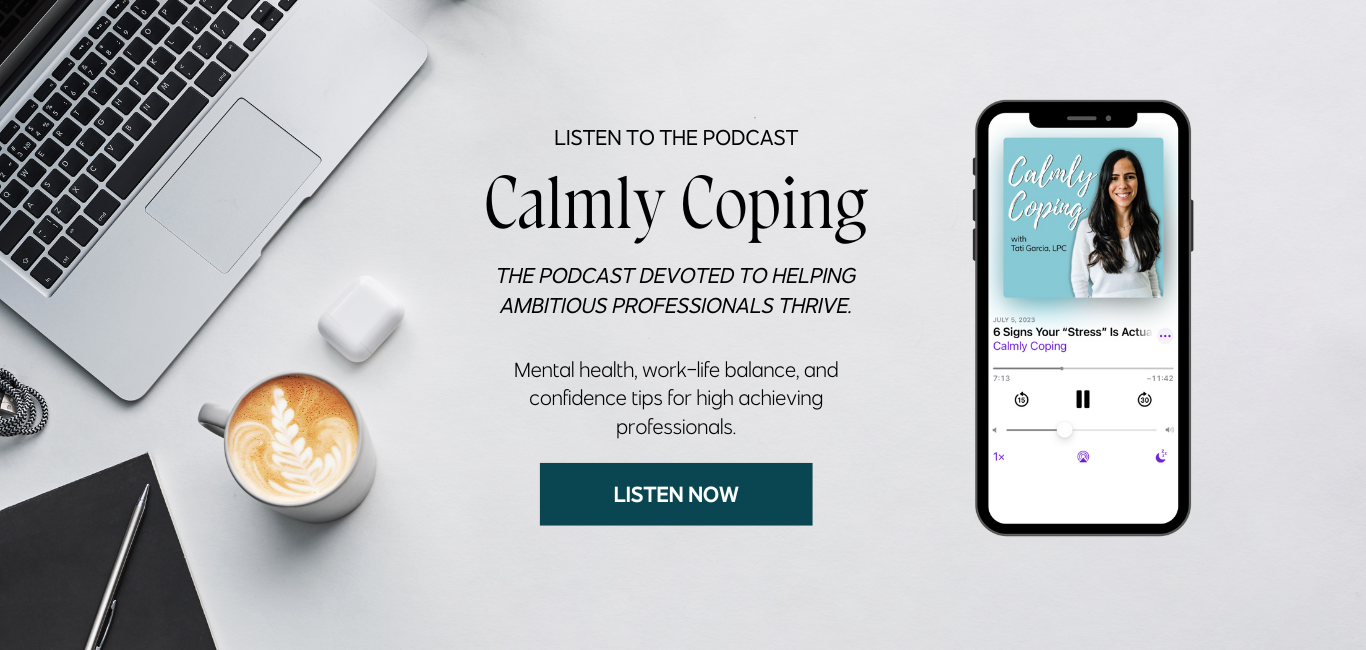Having a difficult coworker can be challenging and interfere with your work satisfaction and possibly make it more difficult for you to get your own work done. We spend much of our time at work, therefore it can be powerful to know what to do when you have a difficult coworker, because sometimes just ignoring it or hoping it will get better isn’t enough. In this episode, we’ll explore practical ways for you to deal with a difficult coworker so you can feel more of a sense of peace at work.
In this episode, you will learn:
- Actionable steps to manage difficult coworkers
- Simple mindset shifts to improve your peace at work
- How to practice emotional wellness in order to improve your resiliency when handling conflict at work
LISTEN NOW:
🎧 CLICK HERE TO LISTEN TO CALMLY COPING WHEREVER YOU LISTEN TO PODCASTS
WATCH NOW:
JOIN THE CALMLY COPING GROUP: The free supportive community for high-achievers with high-functioning anxiety. Join Today: Calmly Coping Group
SUBMIT A MESSAGE, QUESTION, COMMENT OR SUGGESTION TO THE PODCAST: Message
FREE TRAINING: Achieve A Calm Mind, Balanced Life, & Empowered Confidence in 90 Days
If you want to learn how to take back control of your life so you can feel calmer and more confident, and learn the tools to spend your time according to what matters most to you (no matter what your schedule is like right now)…

LISTEN, REVIEW, AND SUBSCRIBE TO THE PODCAST!

INTRO/OUTRO MUSIC: Rescue Me (Instrumental) by Aussens@iter (c) copyright 2018 Licensed under a Creative Commons Attribution (3.0) license. http://dig.ccmixter.org/files/tobias_weber/57990 Ft: Copperhead
DISCLAIMER: All content here is for informational purposes only. This content does not replace the professional judgment of your own mental health provider. Please consult a licensed mental health professional for all individual questions and issues.
Interested in diving deeper to get support for high-functioning anxiety?
I offer 1:1 coaching to help high-achievers overcoming high-functioning anxiety so they can feel calmer, more present, and have improved balance in their lives. Click here if you’re interested in learning more and getting started.
Calm, Balanced, & Confident is my comprehensive A→Z self-paced course to help high-achieving professionals overcome high-functioning anxiety so they can feel calmer, balanced, and more confident without the anxiety and overwhelm. Click here to learn more and enroll today.
Looking for ongoing support and guidance with high-functioning anxiety? The Calm & Ambitious Community is the exclusive community for high achievers with high-functioning anxiety. Click here to learn more and join us today!
TRANSCRIPT:
Click to view the episode transcript.
Having a difficult co worker can be challenging. It can interfere with your work satisfaction and possibly make it more difficult for you to get your own work done. We spend much of our time at work. Therefore, it can be powerful to know what to do when you have a difficult co-worker. Because sometimes just ignoring it or hoping it will get better isn’t enough.
In this episode, we’ll explore practical ways to deal with a difficult co worker so you can experience more of a sense of peace at work.
Welcome to Calmly Coping. My name is Tati Garcia and I’m a licensed therapist and coach specializing in high functioning anxiety. I help high achievers stop putting themselves last so they can feel calm, balanced, and confident from within. If this topic interests you, then please like, subscribe, and hit the notification bell so you’ll be notified every time I release a new episode.
Thank you so much for tuning in. What does a difficult coworker look like? Now, it can look like so many different things and what bothers you personally could be different than what bothers somebody else. However, it can look like conflict. So somebody who maybe has a tendency to get into conflict or that you have gotten into conflict with.
It can look like differing or strong opinions. It can look like somebody who doesn’t do their work or doesn’t do their work fully or in the way that they’re supposed to be doing it if there are certain standards or expectations. It can look like differences in working styles or values or many other things.
These are just a few of the examples. I want to jump right into it and get straight to the tips of what you can do. When you’re experiencing a difficult coworker, tip number one is to not take it personally recognize that when somebody is behaving a certain way. Oftentimes, this is just the way they are, and it has nothing to do with you.
Even if it is about you, the way that they’re behaving and reacting is really about you. Them and the way that they handle conflict or the way that they react to things This is something I actually recently learned in an audiobook I was listening to by Terry real and I believe is called fierce intimacy So the concept is to basically visualize that you are setting a boundary or a force field around yourself So imagine that there is like a clear path Plexiglass circle around you or whatever that boundary looks like.
And when somebody is saying something that is harmful or disturbing or concerning to you, imagine it’s kind of bouncing off of that force field. And you can allow through the things that you want to allow through. However, the things that are really bothersome or triggering for you, they can bounce off and you don’t need to allow them to get through into your kind of bubble of space.
Sometimes this can be a helpful visualization if this is a person that you have to interact with frequently and you can’t necessarily make them change their behavior. There are things that you can do to communicate and speak up for yourself, which I’ll be talking about in a little bit, but this first tip of not taking things personally can be really helpful.
Next is to be understanding. Now this might seem counter intuitive, but recognize that everybody has their struggles. And especially if that’s at work, you may not necessarily know what they’re going through. Maybe they’re going through a difficult time at work. at home or going through other things in their life that could be coming out in the way that they experience things or express themselves at work.
And it might be difficult for them to handle stress as a result. This is not to justify any sort of harmful behavior that they may be expressing towards you or it’s not to justify them not picking up the slack. However, it can explain what they’re going through. And sometimes having that understanding, compassion can make your approach different when interacting with them and rather coming from a place of frustration or irritability, you can come with more of a sense of compassion towards what they’re going through. Next tip is to speak up for yourself. So this can be talking it over with them if it’s something that is bothering you or a behavior that needs to change and what can really help is to use I statements because if you go at somebody kind of blaming them and saying you keep doing this and you’re not doing your work.
The automatic human response is going to be to get defensive. So they’re going to speak up for themselves and stop listening. And that can sometimes end a conversation or end a productive conversation and get you nowhere. So when we’re using I statements, you are going to express your experience. When I’m talking about I statements that can be starting with I feel.
Not I feel like, because I feel like is kind of a shortcut into a blaming statement because then you’re kind of going into. I feel like you’re doing this or I feel like when this happens, but when you say I feel you can start with an emotional statement. I’m feeling frustrated or I feel frustrated. when you make statements like that.
I feel hurt. Or if it’s difficult for you to start with an emotion, you can just point out what the consequence is of the behavior. So one approach can be, especially if it’s a team environment, how can we work better together as a team? I’ve noticed that you haven’t been handing in your reports on time and that has a negative impact on our ability to reach our goals together as a team.
How can we work together so that we’re all ensuring that we’re performing our best as a team? So this can take the kind of staying out of you never submit your assignments on time or whatever it might be to more of a conversation that will encourage somebody to be receptive to hear what you have to say.
And this can create a sense of safety within the conversation. Another tip can be to go to somebody and report this. So maybe this is informing a supervisor or human resources in getting support, expressing your concerns, expressing how this is affecting you, you. And seeing if this is something that they can address with the person or that can be addressed during a meeting, especially if it’s something that continues to happen, or if it’s a really serious problem.
Maybe that could include changes in staffing. Another tip that can be helpful when it comes to a coworker that is difficult is having an outlet. When we keep things inside, And that includes stress or difficult experiences. It can build up and sometimes come out in other ways. Maybe it comes out towards your family members or towards those that you care about.
Or maybe it is causing you to feel really angry inside or really down or really stressed and anxious. So that’s why it’s really important to have an outlet so you can let these things out. So this can be venting to a friend or a partner, this can be writing down what you’re experiencing and getting those emotions and thoughts out in a journal.
It can be going to therapy or having some other kind of support. So having some sort of outlet can be really powerful rather than holding this all inside and dealing with this on your own. Another tip can be to set boundaries. So this can look like not enabling your coworker. If this is somebody who’s constantly dropping the ball, not constantly jumping in and helping them, because that’s just going to enable their behavior and make them see that, Oh, well, when I don’t do this, then Natalie just comes in and does all my work for me.
So I don’t have to worry about doing it. So it’s important to set boundaries with how much you are willing to help in order to not continue to reinforce this type of behavior that you’re not happy with or that has been difficult for you. This is of course going to depend on the situation and what is occurring and another way of setting boundaries can be not engaging if they’re being offensive or hurtful.
This can include walking away from the conversation or letting them know I don’t talk about these things or I don’t want to talk about these things. at work or at all. It is perfectly okay for you to set a boundary, especially in a working environment with what you are comfortable discussing and what you want to basically shut down in a conversation.
Another tip can be to be kind. I mentioned before being understanding and compassionate. And that can be when it comes to your, how you’re addressing it, how you’re feeling on the inside, like how you’re thinking about the situation, whereas being kind is, this is how you are treating, this is your behavior towards the other person.
One example is that I used to be a cashier at Toys R Us, back in the day, when it was, uh, still open, still a retail store. I know that they’ve opened a few in like malls here and there, but like I was in the kind of big box Toys R Us store, and I used to work as a cashier. We would have rude customers come in from time to time.
If you’ve ever worked in customer service or in retail, I’m sure you’ve experienced rude customers, and my approach would be to kind of quote unquote kill them with kindness. So when they were being rude or disrespectful to me over something that was all the time, if not often, not my fault, because oftentimes when somebody’s frustrated with something at a retail store or a customer service concern, it’s not towards you.
It’s because of something that’s often beyond your control, I would be kind to them and be like, smile and understanding. And sometimes this can help to deescalate the situation because you’re not matching the person where they are emotionally. Our tendency as humans is to unconsciously match where somebody is emotionally.
So if they’re coming at you with anger or frustration, we want to match them back with anger and frustration. If you can bring it down to kindness, then sometimes this can help to deescalate their emotional state. And it’s also not giving them the reaction that they might expect. This can sometimes be helpful to prevent a situation from getting worse, especially if somebody is coming with strong emotions.
But I want to emphasize, don’t say things like, calm down or you’re overreacting. Those can be very inciting and triggering statements. So just being kind, but not being condescending or not trying to tell them to control their emotions because those can sometimes, as I’m sure you’ve experienced, be difficult statements to hear because it’s not always something that’s as easy as, all right, I’m going to calm down now.
And this can be hard to be kind in. difficult situations in conflictual situations. However, it can sometimes be helpful. And another tip is just general emotional wellness. So this is taking steps to care for your own mental health, because ultimately these are things that can help you to cope with the difficult coworker, to cope with the stressors that come up at work so that you can kind of have you.
a protective layer of things that you’re doing to care for yourself. This can look like a therapy, coaching, meditation, journaling, emotional awareness and processing, physical activity like exercise, yoga, et cetera, having a support system. And when it comes to processing things, it can also sometimes be helpful to reflect on why this thing that this co worker is bothering you.
Sometimes our own triggers can be signs for our own personal healing or direct us to our own values. So for example, if you’re feeling disrespected by another person and maybe you’re thinking, I would never do what this person is doing. I can’t believe they’re doing this to me. then you may be judging them because you feel like this goes against your values and goes against what you would do.
So sometimes these moments of being triggered, these moments of judgment, these moments of difficulty with others, this isn’t just limited to a work environment, but that can be signs for our own inner healing and awareness. If you’re looking for more support, you can join our free Facebook community for high functioning anxiety by going to calmlycoping.com/group. You can ask your questions and receive support from other individuals there. And if you’d like to submit a message for the podcast, maybe it’s a question, a thought or comment on this topic or on anything else related to high functioning anxiety, you can go to calmlycoping.com/message.
While you wait for next week’s episode, I have other episodes about calming your mind, improving work life balance and feeling more confident from within. So you can check out these episodes here. Thank you so much for tuning in today and until next time, be calm.


Until next time…













